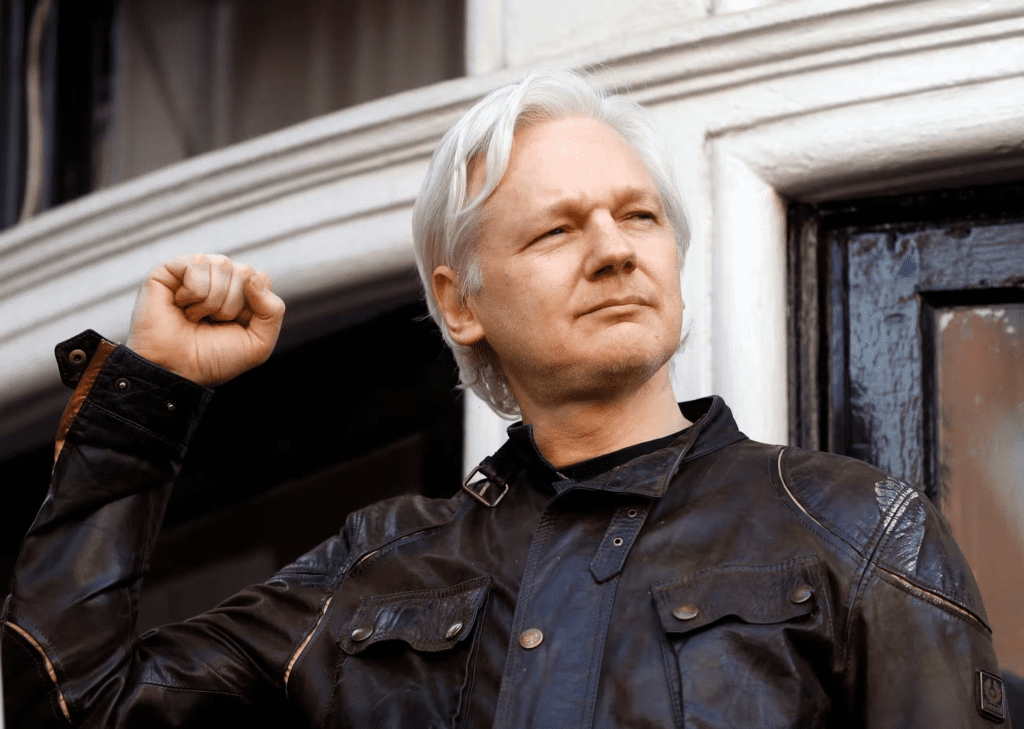Duncan Campbell
If his appeal fails this week, the WikiLeaks founder could soon be on a plane towards a potential jail term of 175 years
Walk past the Royal Courts of Justice in London on a week day and you will often spot small gatherings of people holding placards and handing out leaflets about a case being held inside. On Tuesday, there will be many such souls on the pavement, making no secret of their views on a case that has ramifications for journalism around the world.
Inside, in a packed court, two high court judges will hear arguments in an application for leave to appeal that Julian Assange, the founder of WikiLeaks, should not be taken from the high-security Belmarsh prison to face a trial and a potential 175-year jail sentence in the US, where he faces 18 criminal counts for his alleged role in obtaining and disclosing classified documents.
These revealed details of US activities in Iraq and Afghanistan, including attacks on civilians. They also revealed details of the US treatment of prisoners in Guantánamo Bay and links to clandestine activities in the Middle East.
Computer hacker Gary McKinnon
Earlier this month, in an unconnected case, former CIA officer Joshua Schulte was sentenced in New York to 40 years for leaking classified information to WikiLeaks.
A key aspect of the prosecution of Assange that has emerged is the attempt by US authorities to persuade journalists who have been critical of Assange, an often controversial figure, to give evidence against him.
At least four well-known journalists have been approached by the Metropolitan police on behalf of the FBI: James Ball, his ex-WikiLeaks colleague, who is now with the Bureau of Investigative Journalism; David Leigh, the former Guardian and Observer journalist; Heather Brooke, a freedom of information campaigner; and Andrew O’Hagan, who had been commissioned to ghost Assange’s autobiography.
All of them have declined to cooperate with the FBI. In an article for Rolling Stone last year, Ball said that he had first been approached in 2021 and subjected to pressure, including the threat of being prosecuted himself.
O’Hagan said that although he had his differences with Assange, he would happily go to jail rather than assist the FBI. “I would only add that the attempt to punish Assange for exposing the truth is an attack on journalism itself. I notice that none of those mainstream collaborators who published his material – the New York Times, the Guardian, and Der Spiegel – are being pursued, which demonstrates that a generational bias against internet-based journalism is at the heart of the case … If Julian goes to the US, Britain will have failed to protect one of the first principles of democracy.”
In a British Journalism Review article last year, Leigh wrote: “Unlike the US military, he [Assange] does not have blood on his hands.” He added last week: “It’s unbelievably cruel and unnecessary to punish Assange in this way.”
One journalist who was not contacted and who says he would also have dismissed any approach is Nick Davies, who worked closely with Assange while at the Guardian. “When we were publishing this material, we had two reasons for reckoning that the US would not prosecute Julian,” Davies said.
“One was that in good conscience they could not twist their espionage act into a weapon to attack journalism. The other was that no decent administration could prosecute Julian while ignoring the catalogue of disgusting crime by US forces and their allies which we were exposing.
“All through the [Barack] Obama years, those assumptions held good. It took [Donald] Trump – immoral and indecent – to overturn them. It’s just shameful that [Joe] Biden’s people are using Trump as their guide.”
The National Union of Journalists, like Reporters Without Borders, is a firm supporter of Assange, as are many organisations, including Amnesty International and Human Rights Watch.
The UN special rapporteur on torture, Alice Jill Edwards, has now urged the government to halt the extradition, based on fears that he would be at risk of treatment amounting to torture.
The last such extradition battle, involving the computer hacker Gary McKinnon, was only halted in 2012 by the then home secretary, Theresa May; Labour home secretaries had previously declined to intervene.
Janis Sharp, McKinnon’s mother, who led the fight to halt the extradition, said last week: “The human rights of Julian Assange, his wife [Stella] and his two children are not just being ignored, they are being trampled on. To prevent children from having a life with their father because, through his job as a journalist, he exposed shocking information that was in the public interest is cruel and unusual punishment indeed.”
Janis Sharp
Apart from his fallouts with fellow journalists, Assange was also accused of sexual offences in Sweden in 2010. He declined to return there to face charges, claiming that this could have led to his extradition to the US, but agreed to be interviewed by Swedish authorities in London, an offer that was not taken up. The case led to many criticisms of Assange.
Journalistically, support has come from across the spectrum. Alan Rusbridger, the Guardian’s editor during the long WikiLeaks saga, wrote this month in Prospect, which he now edits: “I know they won’t stop with Assange. The world of near-total surveillance, merely sketched by [George] Orwell in Nineteen Eighty-Four, is now rather frighteningly real.”
Peter Hitchens, no fan of Assange, wrote on the MailOnline website: “Even a self-respecting poodle would object to the way we are currently behaving towards the US. We are on the brink of allowing the American government to reach into this country and seize a man who has broken no British law.”
Australia’s parliament has just passed a motion by 86 votes to 42 calling for the release of Assange.
Support from British politicians has not been so widespread. Only 35 parliamentarians wrote to the US attorney general last year to demand Washington drop the case. Leeds East MP Richard Burgon, who organised the letter, said: “Any extradition would, in effect, be putting press freedom on trial.”
He was joined by 13 fellow Labour MPs, two Scottish National party MPs, Conservative MP David Davis, Caroline Lucas of the Greens and members of the House of Lords.
All of those, not to mention the many people who will gather outside the court on Tuesday, must now wait for the high court’s ruling and what it may mean for Assange – and journalism.


